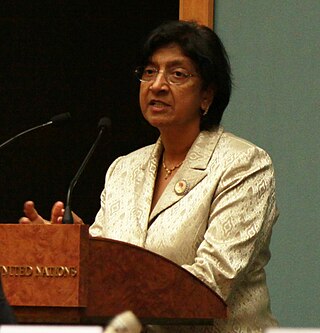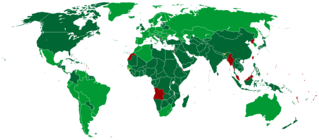Racism is discrimination and prejudice against people based on their race or ethnicity. Racism can be present in social actions, practices, or political systems that support the expression of prejudice or aversion in discriminatory practices. The ideology underlying racist practices often assumes that humans can be subdivided into distinct groups that are different in their social behavior and innate capacities and that can be ranked as inferior or superior. Racist ideology can become manifest in many aspects of social life. Associated social actions may include nativism, xenophobia, otherness, segregation, hierarchical ranking, supremacism, and related social phenomena.
The crime of apartheid is defined by the 2002 Rome Statute of the International Criminal Court as inhumane acts of a character similar to other crimes against humanity "committed in the context of an institutionalized regime of systematic oppression and domination by one racial group over any other racial group or groups and committed with the intention of maintaining that regime".
United Nations General Assembly Resolution 3379, adopted on 10 November 1975, "Determines that Zionism is a form of racism and racial discrimination" with 72 votes in favour, 35 votes against, and 32 abstentions. It was revoked by Resolution 46/86, adopted on 16 December 1991 with 111 votes in favour, 25 votes against, and 13 abstentions. The vote for Resolution 3379 was held nearly one year after the adoption of Resolution 3236 and Resolution 3237: the former recognized the "Question of Palestine" and invited the Palestine Liberation Organization (PLO) to participate in international diplomacy; and the latter designated the PLO as a non-member Assembly observer following the "Olive Branch Speech" by Palestinian political leader Yasser Arafat.

The Convention on the Elimination of all Forms of Discrimination Against Women (CEDAW) is an international treaty adopted in 1979 by the United Nations General Assembly. Described as an international bill of rights for women, it was instituted on 3 September 1981 and has been ratified by 189 states. Over fifty countries that have ratified the convention have done so subject to certain declarations, reservations, and objections, including 38 countries who rejected the enforcement article 29, which addresses means of settlement for disputes concerning the interpretation or application of the convention. Australia's declaration noted the limitations on central government power resulting from its federal constitutional system. The United States and Palau have signed, but not ratified the treaty. The Holy See, Iran, Somalia, Sudan, and Tonga are not signatories to CEDAW.

The International Day for the Elimination of Racial Discrimination is observed annually on 21 March since declared by the United Nations in 1966. In South Africa, the country in which the event took place that gave rise to the observance, the Sharpeville Massacre, the day is commemorated as Human Rights Day, and is a public holiday.
The 2001 World Conference against Racism (WCAR), also known as Durban I, was held at the Durban International Convention Centre in Durban, South Africa, under UN auspices, from 31 August to 8 September 2001.

Human rights are largely respected in Switzerland, one of Europe's oldest democracies. Switzerland is often at or near the top in international rankings of civil liberties and political rights observance. Switzerland places human rights at the core of the nation's value system, as represented in its Federal Constitution. As described in its FDFA's Foreign Policy Strategy 2016-2019, the promotion of peace, mutual respect, equality and non-discrimination are central to the country's foreign relations.
The year 2001 was declared the International Year of Mobilization against Racism, Racial Discrimination, Xenophobia and Related Intolerance by the United Nations General Assembly.
Gay Johnson McDougall is an American lawyer who has spent her career addressing international human rights and racial discrimination. She is currently a Distinguished Scholar-in-Residence at the Leitner Center on International Law and Justice of Fordham University Law School. She was executive director of Global Rights, Partners for Justice. In August 2005, she was named the first United Nations Independent Expert on Minority Issues, serving until 2011.
The continent of South America is culturally and racially diverse. This article examines by country and region the current and historical trends in race relations and racism within South America. Racism of various forms is to be found worldwide. Racism is widely condemned throughout the world, with 170 states signatories of the International Convention on the Elimination of All Forms of Racial Discrimination by August 8, 2006. In different countries, the forms that racism takes may be different for historic, cultural, religious, economic or demographic reasons.
The article describes the state of race relations and racism in the Middle East. Racism is widely condemned throughout the world, with 174 states parties to the International Convention on the Elimination of All Forms of Racial Discrimination by April 8, 2011. In different countries, the forms that racism takes may be different for historic, cultural, religious, economic or demographic reasons.
The Durban Review Conference is the official name of the 2009 United Nations World Conference Against Racism (WCAR), also known as Durban II. The conference ran from Monday 20 April to Friday 24 April 2009, and took place at the United Nations Office in Geneva, Switzerland. The conference was called under the mandate of United Nations General Assembly resolution 61/149 with a mandate to review the implementation of The Durban Declaration and Programme of Action from the 2001 World Conference against Racism, Racial Discrimination, Xenophobia and Related Intolerance which took place in Durban, South Africa.
Defamation of religion is an issue that was repeatedly addressed by some member states of the United Nations (UN) from 1999 until 2010. Several non-binding resolutions were voted on and accepted by the UN condemning "defamation of religion". The motions, sponsored on behalf of the Organization of the Islamic Conference (OIC), now known as the Organisation of Islamic Cooperation, sought to prohibit expression that would "fuel discrimination, extremism and misperception leading to polarization and fragmentation with dangerous unintended and unforeseen consequences". Religious groups, human rights activists, free-speech activists, and several countries in the West condemned the resolutions arguing they amounted to an international blasphemy law. Critics of the resolutions, including human rights groups, argued that they were used to politically strengthen domestic anti-blasphemy and religious defamation laws, which are used to imprison journalists, students and other peaceful political dissidents.
Racism in Canada traces both historical and contemporary racist community attitudes, as well as governmental negligence and political non-compliance with United Nations human rights standards and incidents in Canada. Contemporary Canada is the product of indigenous First Nations combined with multiple waves of immigration, predominantly from Europe and in modern times, from Asia.

Slavery in international law is governed by a number of treaties, conventions and declarations. Foremost among these is the Universal Declaration on Human Rights (1948) that states in Article 4: “no one should be held in slavery or servitude, slavery in all of its forms should be eliminated.”

The International Convention on the Elimination of All Forms of Racial Discrimination (ICERD) is a United Nations convention. A third-generation human rights instrument, the Convention commits its members to the elimination of racial discrimination and the promotion of understanding among all races. The Convention also requires its parties to criminalize hate speech and criminalize membership in racist organizations.
Yoko Hayashi is a Japanese lawyer and partner in the Athena Law Office. She was formerly an alternate member to the United Nations Sub-Commission on the Promotion and Protection of Human Rights from 2004 to 2006. In 2008, she became a member of the Committee which monitors the Convention on the Elimination of All Forms of Discrimination against Women (CEDAW), and in 2015 was serving as Chairperson of the Committee on the Elimination of Discrimination against Women. Hayashi has used her legal expertise to improve the status and protect the rights of women.

Kadra Ahmed Hassan is Djibouti's Permanent Representative to the United Nations and the World Trade Organization.
The 1973 United Nations International Convention on the Suppression and Punishment of the Crime of Apartheid was the first binding international treaty which declared the crime of apartheid and racial segregation under international law. It was adopted by the General Assembly on 30 November 1973 and came into force on 18 July 1976. It passed by 91 votes in favor, four against and 26 abstentions. 110 countries are currently parties to the convention, with 26 signatories.

Rita Izsák-Ndiaye is an independent senior human rights expert and former Hungarian diplomat. She has worked on human, minority and youth rights in various NGOs, the Hungarian Government and with international organizations. She served as the United Nations Special Rapporteur on minority issues between 2011 and 2017, as well as member and Rapporteur of the UN Committee on the Elimination of Racial Discrimination between 2018-2022. In 2021 and 2022, she was the Personal Representative of the OSCE Chairperson-in-Office on Children and Security. As of autumn 2022, she is Senior Adviser on Anti-Racisam at UNDP.








